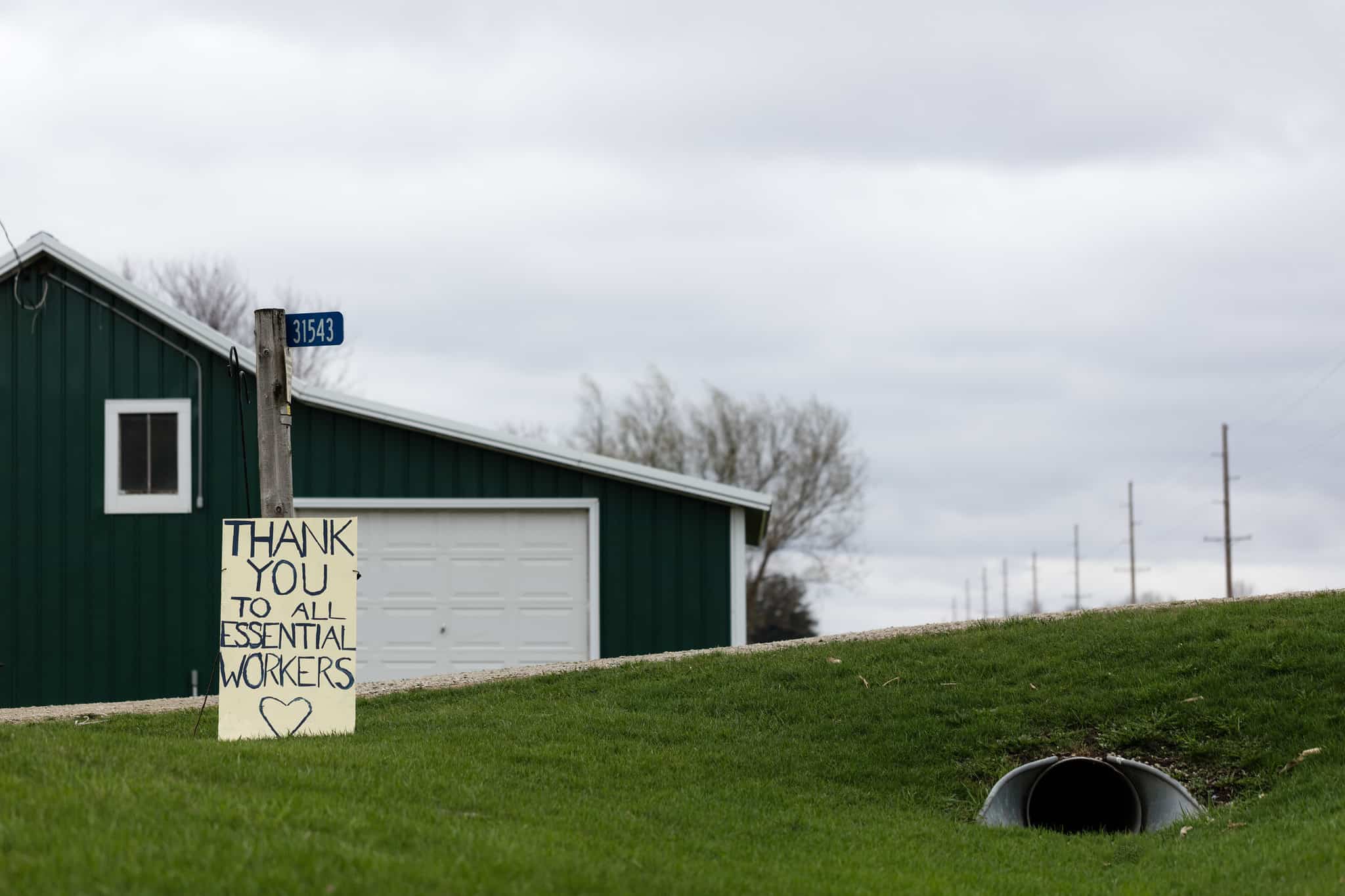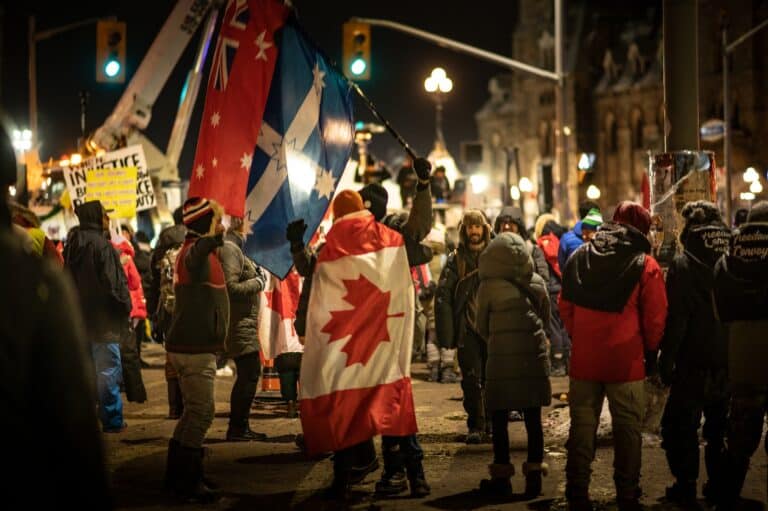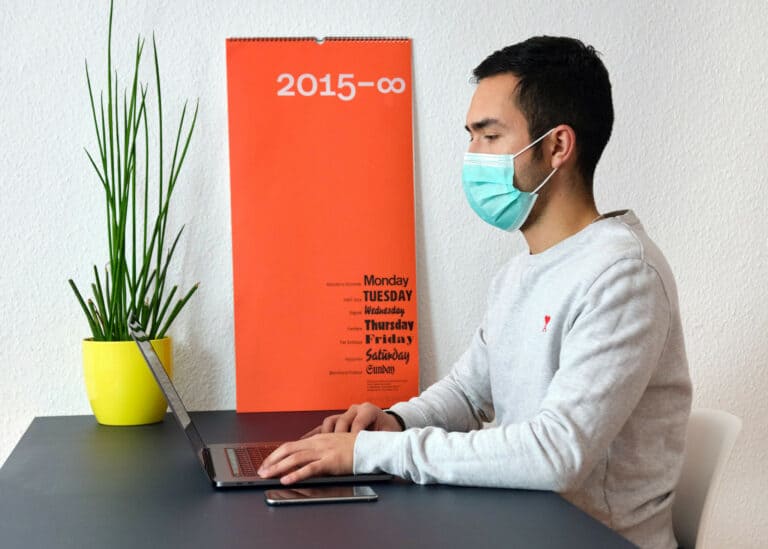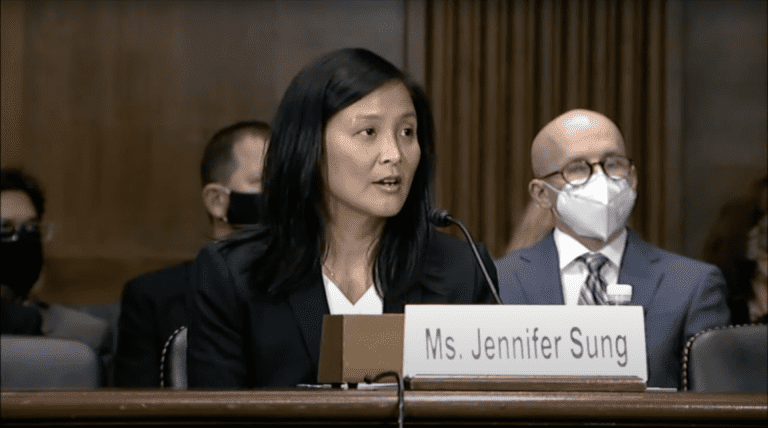
Kevin Vazquez is a staff attorney at the International Brotherhood of Teamsters. He graduated from Harvard Law School in 2023. The opinions he expresses on this blog are his own and should not be attributed to the IBT.
As the coronavirus pandemic finally, fitfully, draws to some sort of conclusion, the “essential worker” discourse that occupied headlines and corporate advertisements for months is beginning to fade commensurately. The corporate executives, commentators, politicians, and journalists who lavished praise on frontline workers are already beginning to abandon such rhetoric as the public, possibly prematurely, begins to collectively move beyond the pandemic. For frontline workers themselves, of course, this will make little difference: their working conditions, notwithstanding the lofty acclaim suddenly bestowed upon them, had hardly changed. They were still mistreated, exploited, and underpaid – only now while a corporate mouthpiece “thanked” them for their “sacrifice” in the process. In any event, that the “essential worker” dialogue is disappearing as quickly as it arose merely demonstrates what was true from the start. The language of the “essential worker” was cynically appropriated by corporations – the very exploiters who materially benefited from their “sacrifice” – to launder their responsibility and to rationalize the coercive social order that compelled underpaid workers to surrender their bodies and health for corporate profits.
The pandemic offered an opportunity for our society to explore profound and complex questions about work, production, distribution, and profit. It produced an unparalleled logistical crisis that would have invariably required some degree of sacrifice and selflessness from many people. Rather than collectively discussing the ways to most fairly distribute these hardships as a society, however, corporate executives, enabled by politicians and the mass media, simply compelled the working class – utilizing the vague language of “heroism” and “sacrifice” as a shield – to bear a greatly disproportionate share of the burden. Cynical praise for the “brave” and “selfless” essential workers, who had been coerced into placing themselves in serious danger, displaced this collective dialogue and veiled the unjust and exploitative outcome that resulted.
Corporate displays of gratitude, praising essential workers for their heroism, began appearing in the media and advertisements by the end of March 2020 and quickly became ubiquitous. Jeff Bezos wrote an open letter praising Amazon workers for their “vital service.” Walmart ran a television ad thanking its workers. Elon Musk wrote Tesla’s workers a thank you note. Everywhere, advertisements thanking and praising essential workers – by companies from Toyota to Verizon to Grubhub – suddenly bombarded radio airwaves and television screens. Many politicians, including then-President Donald Trump at the Republican National Convention, also got in on the action.
Beneath this hollow verbal appreciation, however, lurked a different reality. By calling workers “essential” and turning them into heroes, their deaths become justified – a noble sacrifice for the greater good. This sentiment, to be sure, is understandable when coming from an ordinary person, but it is something much more akin to crass cynicism when coming from a corporate executive or powerful politician – especially when they are the ones compelling the workers to return without benefits or protection. Moreover, the definition of what, precisely, constituted an “essential” worker was itself notoriously ambiguous, which raised obvious questions concerning the genuine motivation behind these decisions. Countless workers deemed essential – including many construction workers, restaurant workers, or beauty salon and golf course workers, among others – were, to borrow the words of an electrician quoted in the New York Times, “essential to the pocketbooks of rich contractors and essential for spreading the virus, but that’s about it.”
In reality, while many essential workers were indeed heroic, they were also victims, unwillingly conscripted into service by a coercive economic system which used euphemism to shield the violence that underlay it. This is not mere hyperbole: Hundreds of thousands of frontline workers have contracted the virus, thousands of whom – if not more – have died, and the impact on their housemates, families, and loved ones is immeasurable. That these workers were disproportionately Black and Latino is shamefully predictable. Meanwhile, billionaires collectively – and uncoincidentally – gained $1.9 trillion in wealth during 2020, one of the largest upward transfers in modern history. Workers, on the other hand, received little beyond meaningless platitudes in exchange for the wealth their sacrifice had produced.
Essential workers, packed into crowded restaurants, factories, and grocery stores, did not, generally speaking, receive unemployment benefits, increased pay, paid sick leave, or better working conditions during the pandemic. Many of them do not have health insurance, and they were often not even afforded basic protections against the virus. Indeed, it is more than curious – and lends itself to a much broader critique of our economic system – that the workers deemed most critical to the continued functioning of our society are also often the most mistreated and worst paid. In every state, the average salary for workers deemed essential was below the state’s average – and millions earn less than $10 an hour. These workers, despite the critical importance of their work, occupy the most precarious and insecure position in our social hierarchy; they are exploited in the best of times. During the pandemic, these tensions were only magnified, and they laid bare the coercive and unjust foundation that underlies our society.
The coronavirus pandemic occasioned an opportunity to have a broader societal discussion about work, sacrifice, service, and fairness. It presented unprecedented logistical and humanitarian problems. Goods and services needed to be provided; food needed to be produced and distributed; grocery stores needed to be stocked; mail needed to be delivered; hospitals needed to be staffed, equipped, and well-functioning. These problems, to be sure, were complex and challenging, and resolving them would have inevitably required some measure of dedication and sacrifice from many people. But we, as a society, never discussed ways to most fairly place this burden – such as redistributing wealth created during the pandemic, instituting sectoral bargaining, or, at a minimum, ensuring that frontline workers were fairly compensated and protected – or to most safely and rationally distribute necessary goods and services. Instead, we allowed vague abstractions about “heroism” and “bravery,” pushed primarily by the very corporations and politicians who stood to gain the most, to stand in as a substitute for these vital discussions.
It is difficult to know what arrangement would have been established if we had a fair, open, and robust public discussion in a truly democratic society. Perhaps frontline workers would have returned to work regardless – only this time armed with a living wage, free medical treatment, union representation, paid sick leave, shorter workdays, and better protective equipment and practices. Perhaps the corporate executives and politicians who cheered for “reopening” the economy would have been the ones washing dishes or stocking shelves. Perhaps we would have dramatically reimagined our system for producing and distributing goods and services. Or perhaps even more radical proposals – such as worker self-management and distribution of profit – would have been adopted. In any event, these alternatives were left unexplored. Instead, essential workers had “heroism” foisted upon them by corporate employers who quarantined in palatial estates and ordered their groceries online, and we, satisfied that these “heroes” were selflessly sacrificing themselves in our service, did not ask any questions. These workers, however, did not ask to be heroes – and those who died did not ask to be martyrs. We do owe them a thank you, to be sure. But, more than anything, we owe them a fairer, more equal, and more democratic society.










Daily News & Commentary
Start your day with our roundup of the latest labor developments. See all
December 11
In today’s News and Commentary, Biden’s NLRB pick heads to Senate vote, DOL settles a farmworker lawsuit, and a federal judge blocks Albertsons-Kroger merger. Democrats have moved to expedite re-confirmation proceedings for NLRB Chair Lauren McFerran, which would grant her another five years on the Board. If the Democrats succeed in finding 50 Senate votes […]
December 10
In today’s News and Commentary, advocacy groups lay out demands for Lori Chavez-DeRemer at DOL, a German union leader calls for ending the country’s debt brake, Teamsters give Amazon a deadline to agree to bargaining dates, and graduates of coding bootcamps face a labor market reshaped by the rise of AI. Worker advocacy groups have […]
December 9
Teamsters file charges against Costco; a sanitation contractor is fined child labor law violations, and workers give VW an ultimatum ahead of the latest negotiation attempts
December 8
Massachusetts rideshare drivers prepare to unionize; Starbucks and Nestlé supply chains use child labor, report says.
December 6
In today’s news and commentary, DOL attempts to abolish subminimum wage for workers with disabilities, AFGE reaches remote work agreement with SSA, and George Washington University resident doctors vote to strike. This week, the Department of Labor proposed a rule to abolish the Fair Labor Standards Act’s Section 14(c) program, which allows employers to pay […]
December 4
South Korea’s largest labor union began a general strike calling for the President’s removal, a Wisconsin judge reinstated bargaining rights for the state’s public sector workers, and the NLRB issued another ruling against Starbucks for anti-union practices.